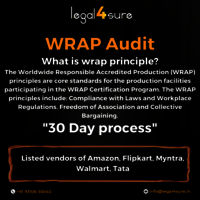Wrap certification
Product Details:
Wrap certification Price And Quantity
- 1 Unit
- 75000 INR/Unit
Wrap certification Trade Information
- New Delhi
- 10 Unit Per Month
- 30 Days
- Yes
- Free samples are available
- As Per Customer
- Asia Australia Central America North America South America Eastern Europe Western Europe Middle East Africa
- All India
- ISO9001:2015
Product Description
In today globalized and increasingly health-conscious world, food safety has become a paramount concern for consumers, regulatory bodies, and food industry professionals alike. With the rise in foodborne illnesses and public awareness regarding the importance of safe food handling practices, businesses operating in the food industry must prioritize compliance with rigorous food safety standards. This is where food safety certification plays a pivotal role.
Food safety certification is a process by which food businesses demonstrate their adherence to specific standards and regulations set forth by regulatory authorities or industry bodies. These standards encompass various aspects of food production, processing, handling, and distribution, aiming to ensure that food products are safe for consumption and meet quality expectations.
Among the myriad of food safety certification bodies, FoodSure stands out as a trusted partner for businesses seeking to enhance their food safety practices and earn the confidence of consumers and stakeholders. With its comprehensive approach, industry expertise, and commitment to excellence, FoodSure offers a compelling choice for organizations looking to achieve and maintain food safety certification.
Understanding Food Safety Certification
Food safety certification serves as a means for businesses to demonstrate their compliance with established standards and regulations governing food safety. These standards are designed to mitigate risks associated with foodborne illnesses, contamination, and other hazards that could compromise the safety and quality of food products.
Certification typically involves a rigorous assessment process conducted by accredited certification bodies or auditors. This process may include on-site inspections, documentation reviews, and testing to verify that the organization's food safety management system aligns with the requirements of the chosen standard.
Key components of food safety certification include:
Hazard Analysis and Critical Control Points (HACCP): HACCP is a systematic approach to identifying, evaluating, and controlling food safety hazards throughout the production process. Certification often requires the implementation of HACCP principles to ensure the proactive management of risks.
Good Manufacturing Practices (GMP): GMP encompasses the practices and procedures necessary to ensure the hygienic production, handling, and storage of food products. Compliance with GMP standards is essential for maintaining the integrity of the food supply chain.
International Standards: Many food safety certification schemes are based on internationally recognized standards such as ISO 22000, SQF, BRCGS, and FSSC 22000. These standards provide a framework for implementing robust food safety management systems that meet global requirements.
Achieving food safety certification offers numerous benefits for businesses, including:
- Enhanced consumer trust and confidence
- Improved market access and competitiveness
- Compliance with regulatory requirements
- Reduced risk of foodborne illness outbreaks
- Operational efficiency and cost savings through streamlined processes
Why Choose FoodSure?
Amidst the plethora of food safety certification bodies, why should businesses choose FoodSure? The answer lies in FoodSure's unique approach, commitment to excellence, and dedication to empowering food industry stakeholders with the tools and knowledge needed to succeed.
Comprehensive Solutions
FoodSure offers a comprehensive suite of services tailored to the diverse needs of food businesses across the supply chain. Whether you're a small-scale producer, a multinational corporation, or a food service establishment, FoodSure provides solutions that are scalable and customizable to your specific requirements.
From initial gap assessments to certification readiness programs, training workshops, and ongoing support, FoodSure accompanies clients every step of the way on their journey to food safety excellence. With a holistic approach that addresses all facets of food safety management, FoodSure ensures that clients are well-equipped to meet and exceed regulatory requirements and consumer expectations.
Industry Expertise
With years of experience in the food industry, FoodSure brings unparalleled expertise to the table. Our team of seasoned professionals comprises experts in food safety, quality assurance, regulatory compliance, and industry best practices. Leveraging this collective knowledge, FoodSure delivers insights and solutions that are grounded in practical experience and tailored to the unique challenges facing food businesses today.
Whether you're navigating complex regulatory landscapes, implementing new technologies, or addressing emerging food safety trends, FoodSure offers guidance and support to help you navigate the path to success with confidence.
Client-Centric Approach
At FoodSure, we understand that every client is unique, with distinct goals, challenges, and priorities. That's why we take a client-centric approach to our services, placing your needs and objectives at the forefront of everything we do.
From the moment you engage with FoodSure, you can expect personalized attention, clear communication, and unwavering commitment to your success. We work closely with you to understand your business requirements, identify areas for improvement, and develop tailored solutions that align with your strategic objectives.
Whether you seeking certification to enter new markets, enhance your brand reputation, or drive operational excellence, FoodSure is here to support you every step of the way. Our dedicated team is committed to delivering results that exceed your expectations and help you achieve your business goals.
Continuous Improvement
Food safety is not a one-time endeavor; it's a journey of continuous improvement. Recognizing this reality, FoodSure emphasizes the importance of ongoing support and collaboration to help clients maintain compliance, mitigate risks, and stay ahead of evolving food safety challenges.
Through regular audits, training programs, and updates on regulatory changes, FoodSure keeps clients informed and empowered to adapt to changing circumstances and emerging trends. Our goal is to serve as a trusted partner for your long-term success, providing the guidance, resources, and expertise you need to thrive in today's dynamic food industry landscape.

Price:
- 50
- 100
- 200
- 250
- 500
- 1000+
















